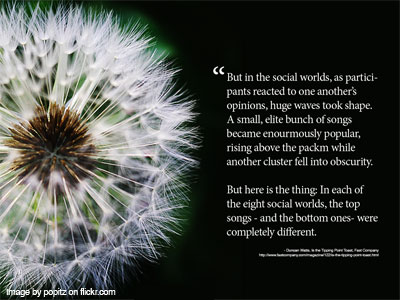In an effort by Fast Company to build a sand storm out of a whisper they present an experiment very relevant to social marketers.
In their last issue Duncan Watts has been made out to challenge Malcolm Gladwell’s Tipping Point thesis (Article: Is the Tipping Point Toast). Although I think it’s not as much a defacing of Gladwell’s book as it is a specification of some of it’s points (Watts is focusing on The influentials theory) and one example (The six degrees of separation)
.
Watts claims that “The influentials theory” (which identifies some “key humans” as super-connectors and crucial to spreading your message from one to thousands of people as they function as connection hubs in the flow of information) is wrong, and bases it on tests he has done with computer simulations. Watts claims that the Influentials does not exist (they do, but are not the same people every time) and that what creates social momentum is rather the ideas social adhesion (which then creates Influentials independently)
.
Now, one of the examples being used is from one of Watts experiments where they designed an online musical downloading service and asked a recruited set of 14000 humans to rank the songs. Where some groups were able to see other peoples ranking evaluations while other groups where not
2and / or partner. The advantages of psychosexual therapy What is sildenafil citrate?.
.
What happened was that in the “traditional world” where the rankers where unable to see each others evaluations the songs where ranked evenly across the board, where as in the Social worlds, as soon as the participants reacted to each other opinions “huge waves” of preference was identified. Creating elite songs on one side of the scale and almost “invisible” songs on the other
.
– At the same time the songs that became popular totally differed from one group to another, proving the unpredictability of social adhesion (which is Watt’s main point)
.
Learning from the experiment one can say that Social Marketing can create a lot of buzz and preference connected to the products preferred by the first participants, but controlling the public’s preference remains to be a challenge.
(Watt’s on the other hand has come to the conclusion that mass marketing is the best form of marketing because it will stand a larger chance of “hitting” a human which is socially exposed to adhere the idea and become an influentor.)


I just stopped by your blog and thought I would say hello. I like your site design. Looking forward to reading more down the road.
Robert Michel